Prof Carles Muntaner Inducted to The Canadian Academy of Health Sciences
September 23/2019
DLSPH Prof. Carles Muntaner has been inducted into the Canadian Academy of Health Sciences – one of the highest honours within Canada’s academic community. DLSPH writer Françoise Makanda spoke with Muntaner to learn more about the award and its impact on his work.
Q: Congratulations on this recognition! How do you feel, and what does it mean to you?
A: It means a lot to be recognized for my work in Canada, my adopted country. I have been a Canadian for a just decade and it is important for me to be recognized for my work on Health Equity/Social Determinants of Health.
Q: What are you currently working on and how does it apply to this recognition?
A: I worked in a range of health equity and social inequalities issues. Two decades ago, I contributed in the development of social class measurement in social epidemiology, political and welfare regimes and population health. I was also involved in the development of realist philosophy in epidemiology and public health, precarious employment or non-standard employment.
While in Canada, I was a health consultant to the Catalan Parliament in Barcelona where I evaluated the implementation of Health in All policies, an oversaw the evaluation of the implementation of WHO’s recommendations on the Social Determinants of Health. I continue to work in these issues in my capacity as Prof at DLSPH with a cross appointment to the Bloomberg Faculty of Nursing.
All of this work is essential in a period of large inequalities, rolling back democracy, and existential threats such a the climate crisis and nuclear war.

Carles Muntaner
Q: Why are your current projects important to public health as a whole?
A: Since the 2008 WHO report on the social determinants of health, it has been established that the conditions in which we are born, raised, learn, worked, and lived are the main causes of morbidity and mortality in human populations. Therefore, my efforts to understand how social mechanisms cause ill health, and then implement and evaluate policies to improve population health averages and reduce social inequalities in health are critical to promote health and prevent disease in populations.
In other words, my research is aligned with the goals public health, and its social justice values. This is often forgotten: Social technologies such as public health should never be value-neutral (in fact they can’t).
Q: What’s next for you at DLSPH?
A: I am looking forward continuing to train students in the areas of social inequities in health and social determinants of health such as Edwin Ng or Faraz Shahidi who took on my research in politics, health and employment respectively and brought it into another level. Teaching on the social determinants of health and the politics of health and health policy within the Collaborative Program and Global Health is another great experience I am looking forward to. I am participating in a number of projects on employment conditions, violence against women and discrimination with other DLSPH faculty. And, I have some ideas about future research that I would like to explore with DLSPH faculty as well…Is there any job better than this one? I do not think so.